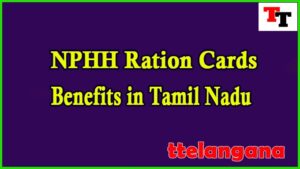NPHH Ration Cards Benefits in Tamil Nadu
The National Food Security Act (NFSA) introduced the concept of ration cards to ensure food security and affordable access to essential commodities for eligible households in India. In Tamil Nadu, the state government has implemented the National Priority Household (NPHH) ration card system, which provides various benefits to the economically vulnerable sections of the population. This article aims to explore the benefits offered by NPHH ration cards in Tamil Nadu and their significance in addressing food insecurity.
Eligibility Criteria for NPHH Ration Cards
To avail of the benefits under the NPHH ration card scheme in Tamil Nadu, certain eligibility criteria must be met. This section will highlight the criteria such as income limits, family size, and other factors considered while determining eligibility. It will also mention the application process and the necessary documents required to obtain an NPHH ration card.
Subsidized Food Grains
One of the primary benefits of NPHH ration cards in Tamil Nadu is the provision of subsidized food grains. The state government ensures that eligible households receive essential food items like rice, wheat, and pulses at highly affordable rates. This section will discuss the quantity and variety of food grains provided, along with the subsidized prices. Additionally, it will shed light on the system of fair price shops and the distribution mechanism for ration cardholders.
Cooking Oil and Other Essential Commodities
Apart from food grains, NPHH ration cardholders in Tamil Nadu are entitled to receive subsidized cooking oil and other essential commodities. This section will outline the availability and cost of cooking oil, sugar, salt, and other items provided under the scheme. It will also emphasize the importance of these commodities in ensuring a balanced and nutritious diet for the beneficiaries.

Nutritional Support Programs
To address malnutrition and improve the health of beneficiaries, the Tamil Nadu government has implemented several nutritional support programs for NPHH ration cardholders. This section will discuss initiatives such as the Integrated Child Development Services (ICDS), Mid-Day Meal Scheme, and the provision of eggs to school-going children. It will highlight the positive impact of these programs on the nutritional status of children and pregnant/lactating women.
Maternity Assistance
NPHH ration cardholders who are pregnant or have recently given birth are eligible for maternity assistance under the scheme. This financial aid helps cover medical expenses, including pre and postnatal care. This section will delve into the specific benefits provided, the application process, and the importance of supporting maternal health.
Other Welfare Schemes
The NPHH ration card serves as a gateway to access various other welfare schemes and benefits offered by the Tamil Nadu government. This section will provide an overview of additional programs such as healthcare initiatives, educational support, housing schemes, and skill development programs that are accessible to NPHH ration cardholders. It will highlight how these integrated welfare measures contribute to overall socio-economic development.
Digital Transformation and Reforms
The Tamil Nadu government has taken significant steps towards digitalizing the ration card system and ensuring transparency and efficiency in the delivery of benefits. This section will discuss the digitization initiatives, the introduction of smart ration cards, and the use of biometric authentication. It will also address the challenges faced during the implementation and the subsequent impact on beneficiaries.
Conclusion The NPHH ration card scheme in Tamil Nadu plays a crucial role in providing food security and a host of other benefits to economically vulnerable households. By ensuring access to subsidized food grains, essential commodities, and nutritional support programs, the scheme helps improve the overall well-being of beneficiaries. Moreover, the integration of other welfare schemes and the focus on digital reforms contribute to a more inclusive and efficient public distribution system. However, continued efforts are required to streamline the application process, address potential gaps in implementation, and expand the coverage to reach the deserving population. By prioritizing the welfare of its citizens and investing in social protection measures, Tamil Nadu sets an example for other states in achieving food security and inclusive development.